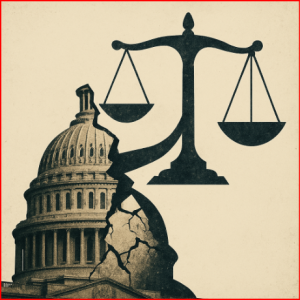I | The Paradox of Power and Law
Since 1945, the United States has stood as both the chief architect and the principal violator of the post-war legal order.
Its leadership built the UN Charter, the Geneva Conventions, and the Nuremberg Principles, yet its subsequent record—Vietnam, Iraq, Afghanistan, and now Gaza—reveals a widening gulf between principle and practice.
The American experiment in global governance was founded on two constitutional ideals:
-
Checks on executive power, and
-
The supremacy of law over might.
But as national security became a permanent condition, those checks weakened. Each invocation of exceptional necessity—from Korea to Iraq—moved the United States further from the very legal system it authored.
II | Selective Enforcement as Structural Habit
The pattern is well-documented.
-
Iraq (2003): The invasion proceeded without Security Council authorization, violating UN Charter Article 2(4). U.S. legal counsel re-interpreted pre-emptive self-defense to justify regime change【1】.
-
Guantánamo Bay (2002–present): The establishment of extrajudicial detention contravened Common Article 3 of the Geneva Conventions, which mandates humane treatment of prisoners【2】.
-
Drone Warfare (2009–2025): Cross-border targeted killings in Yemen, Pakistan, and Somalia challenge Article 51 self-defense criteria and state sovereignty【3】.
-
Gaza (2023–2025): Continued arms transfers and diplomatic protection for Israel despite ICJ and ICC actions place the U.S. on the wrong side of its own legal architecture【4】【5】.
Each episode erodes the reciprocity that sustains law: the idea that those who write the rules will also be bound by them.
III | Constitutional Drift at Home
1. Erosion of Congressional War Powers
Under Article I, Section 8, only Congress may declare war.
Yet since the Gulf of Tonkin Resolution (1964) and the AUMFs (2001, 2002), presidents have waged conflicts by authorization rather than declaration. The result: a 50-year drift toward executive militarism.
2. The Surveillance-Security State
The PATRIOT Act (2001) and its successors normalized warrantless surveillance, secret courts, and metadata collection—measures later ruled unconstitutional in part by the U.S. Court of Appeals (2020) but retained under different authorities【6】.
3. Judicial Self-Limitation
Federal courts repeatedly defer to the executive in “political-question” doctrines, effectively insulating foreign policy from constitutional accountability—seen again in Defense for Children Int’l v. Biden (2025), dismissed despite credible genocide allegations【7】.
These patterns reveal a constitutional paradox: the state that demands global accountability has exempted itself from domestic checks.
IV | Exceptionalism as Doctrine
The 2022 National Security Strategy reasserts that “U.S. leadership is indispensable to the international system.”
But indispensability without restraint mutates into legal unilateralism—the belief that American action is legitimate by virtue of intent, regardless of law.
Political scientist Jack Goldsmith called this “the self-licensing empire”: an executive that universalizes its exemptions【8】.
When allies adopt the same logic—as Israel has in Gaza—the United States confronts its own reflection.
V | The Legal Repercussions Abroad
Selective enforcement has tangible geopolitical costs:
| Area | Consequence of U.S. Double Standard |
|---|---|
| Alliances | Erosion of moral authority in NATO and the Global South; EU and ASEAN partners pursue autonomous legal regimes. |
| Multilateral Institutions | Paralysis in UN Security Council; rise of “mini-lateral” enforcement networks (EU, BRICS Legal Forum). |
| Global South Relations | South Africa, Brazil, and Indonesia use Gaza and Iraq as case studies of Western hypocrisy—fueling multipolar realignment. |
| Human-Rights Jurisprudence | National courts increasingly invoke universal jurisdiction to fill enforcement vacuums once managed by the U.S. system. |
The consequence is cumulative: every exemption weakens the gravitational pull of American credibility.
VI | Echoes from the Dockets of History
The record of tribunals is unambiguous.
-
Nuremberg (1946): “Crimes against peace” defined aggressive war as the supreme international crime.
-
Tokyo Tribunal (1948): Rejected the defense of superior orders.
-
ICJ — Nicaragua v. United States (1986): Condemned U.S. mining of Nicaraguan harbors as an unlawful use of force【9】.
-
ICJ — South Africa v. Israel (2024): Reaffirmed that states aiding violations of the Genocide Convention are complicit【4】.
The line from Nuremberg to Gaza is not rhetorical—it is jurisprudential. The same principles now test their author.
VII | Paths to Restoring Credibility
-
Re-domesticate War Powers: Repeal or sunset AUMFs; require Congressional authorization for force deployments.
-
Reinstate Judicial Review: Narrow political-question doctrine; expand standing for victims of foreign policy decisions.
-
Transparency in Arms Transfers: Mandate public reporting on end-use and civilian-harm assessments.
-
UN Compliance Framework: Align U.S. actions with ICJ and ICC directives; remove blanket exemptions.
-
Re-education of Policy Culture: Return to the legalism of Eleanor Roosevelt and Justice Jackson—law not as instrument, but as limit.
Only through lawful constraint can American leadership reclaim legitimacy in a multipolar age.
VIII | Conclusion — Power Bound or Power Broken
The United States once proved that power could coexist with principle.
If it cannot prove that again, others will not follow—and law will yield to the arithmetic of force.
Empires rarely fall because they are defeated; they fall because they become unbelievable.
The U.S. still has a choice: to lead by law, or to watch the world it built operate without it.
Endnotes
-
UN Charter Art. 2(4); Iraq Inquiry (UK Chilcot Report 2016).
-
ICRC Commentary on Geneva Conventions (2020).
-
UN Special Rapporteur on Extrajudicial Killings, A/HRC/44/38 (2020).
-
ICJ, South Africa v. Israel, Order of 26 Jan 2024.
-
ICC Prosecutor, Applications for Warrants of Arrest — Netanyahu & Gallant, 15 May 2025.
-
U.S. Court of Appeals, ACLU v. NSA, Dec. 2020.
-
N.D. Cal., Defense for Children Int’l–Palestine v. Biden, 2024–2025 filings.
-
Jack Goldsmith, The Terror Presidency (Oxford University Press, 2007).
-
ICJ, Military and Paramilitary Activities in and Against Nicaragua, 1986 I.C.J. 14.
